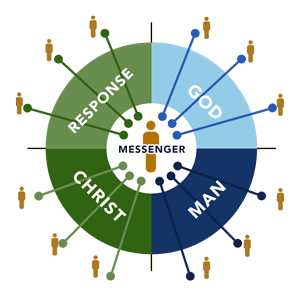Local
Every Person at First Baptist reaching every person they know with the saving message of Jesus Christ.
We want to make sure every person in Jacksonville has the chance to hear and respond to the gospel. At First Baptist, we are people who share. We want to train and equip our members to know how to share their faith with the people in their lives: co-workers, family members, neighbors, and more.
There is one thing in life that matters: faith in Jesus Christ.
By God’s grace, we will take that message to this city.
Get Involved
Local
We have a bold passion for our city! We want Jacksonville to fall in love with Jesus. Consider how you can share in this city what Jesus has done for you.
Global
We have a radical ambition for the nations! Consider how you can give, help, or go to support the great commission across the world.
Who’s Your One?
Who is one person you can intentionally reach this year? We are asking every church member to intentionally invest in reaching one neighbor, one co-worker, one friend, or one family member in Jacksonville.
Not sure where to start? Click here and we can help find a place to serve!
Training Resources
1.PRAY FOR THEM. Write their names on your Reach sheet and put the card in a prominent place in your house. Where will you see it daily? Commit to pray for them regularly. Psalm 126 promises that if we are diligent to sow and ask God for help, then we will see him do great things. We must continually beg the Lord to bring our friends and neighbors to life in Christ. Pray that God would bless you with opportunities to build a relationship with that person and that you would be sensitive to the Spirit for opportunities to minister to that person (Ephesians 6:19 – sidebar would be nice here as well). Pray, because the greatest evangelistic strategy in the world will fail if God does not move through you in that person’s life (Psalm 128:1-2).
2.GREET THEM. Be friendly! A simple smile and hello can be a powerfully warm and meaningful gesture. God made humanity in his own image and every person is valuable (Genesis 1:27). We should seek to show kindness through every means possible because people are valuable and we never know when God will grant us the opportunity to share Christ through relationships. Be intentional. If we aren’t intentional with our greetings, then we will be forgettable and can come across cold. It takes intentionality to be friendly. Learn names. Ask for someone’s name and try to remember it. Write it down on your Reach card or a notebook and pray for them. In the church, the Bible instructs us to greet each other by name because it is important (3 John 1:14; 2 Corinthians 13:12). This is a great habit to extend to unbelievers and shows genuine care.
3.GET TO KNOW THEM. The Bible tells us we are to be slow to speak and quick to hear (James 1:19). This principle requires us to ask questions and get to know others.
Getting to know people is one effective way to follow Christ in evangelism. Jesus knew the people he was attempting to reach. He asked questions and was observant. Following this example gives us opportunity to connect God’s story to the story of the people we are reaching out to.
Ask open ended questions in conversation. Asking open ended questions gives someone the opportunity to express what they are really thinking. Out of the heart the mouth speaks, and it is important to hear the desires of someone’s heart (Luke 6:45; Proverbs 20:5). Here are some examples of questions to get started:
- What brought you to Jacksonville?
- Do you like your job?
- How is your family?
- How can I pray for you?
- How did you and your spouse meet?
- How has being a parent changed your life?
- What do you and your family do for fun?
Observe and note things about those you are reaching so that you can bless them. As you ask questions and get to know others, you will discover important information. You might discover their birthday is near or that they have just found out they are expecting a child. This information is important because you can follow up intentionally with a gesture of kindness in the future.
You might observe that they clam up or become excited when they discover that you attend church or are more spiritual than they are. This is good to observe and you can have an opportunity to follow up and ask them questions about their responses. Follow up questions can include questions like, “I noticed you were excited when I mentioned church, do you consider yourself spiritual?” Or, “What are your thoughts about visiting church? Have you had a good experience or a poor experience?”
4.SHOW CARE / SERVE THEM. Utilize the information you discover in getting to know others in order to love and serve them. Perhaps you learn they are a coffee or tea drinker as you chat at work. You can buy them a special bag of coffee or a nice can of Harney and Sons tea at 4 Grounds to give them the following week. Perhaps you notice that you personally hate dragging your trash can back to your garage every Thursday after the trash collection. You might realize that your neighbors also don’t enjoy this task. This could be an opportunity for you to pull your neighbor’s trash cans up to their garage and surprise them with this small caring act. Perhaps as you get to know your neighbors you learn that they have a busy life and two little toddlers. You can volunteer to babysit them so they can have a well needed date. Perhaps you learn that they have recently had a death in the family. You can send them a hand-written note with a gift card attached and let them know that you are praying for them.
5EXTEND A SOCIAL INVITE. Social invites are easy to offer and have no risk. Typically, the worst that someone can say is “no.” Invite them over to your house for a cookout or a crock pot meal. This is a great way to show Christian hospitality and extend authentic care (1 Peter 4:9). In our culture today, there are people who would never step foot inside a church building, but they would come over for coffee and a board game or popcorn and a movie. If you are into movies, you could continue your regular movie watching activity but just invite a new friend to come watch it with you. If you are a Jaguars fan, you could plan your game day event and just add a new friend along for the fun.
6INVITE THEM TO CHURCH. Inviting someone to church can be a way to open the door to deeper conversations. For various reasons, you might not feel comfortable sharing the whole gospel with someone, but a church invite is a great step. There are always exciting events at FBC JAX that might interest various families or singles. Don’t restrict your church invite to just Sunday morning. Many unbelievers are unable to attend on Sunday mornings due to work schedule, but you can invite them to a different service at a different time. You can tell them about a new Wednesday night teaching series that might interest them or you can tell them about a Sunday night service that is low key and informal. You can observe how someone responds to your church invite and it can give you an indication of their views on spiritual matters. Some might be excited, some might be hesitant, some might have never been invited to church at all! You can follow up on their response and ask further questions about it.
7HAVE A SPIRITUAL CONVERSATION WITH THEM. In biblical relational evangelism, you must get to know someone in numerous ways. You get to know their family history, their leisure preferences, their hobbies and their career dreams. Intertwined in each of these areas are spiritual matters. People are either living according to the flesh or according to the Spirit. It is important that you learn about the spiritual beliefs and practices of the people you are reaching.
Look for ways to introduce spiritual topics. What are their greatest fears or hopes in life? What are griefs or sorrows that have affected them? What are challenges they are facing? These issues can be opportunities to introduce them to God and to ask them their perspective on Jesus. Questions that can help you open up a spiritual conversation can include the following:
- When you are suffering (you can know specifics as you have taken the step of getting to know them), does anything bring you comfort?
- Have you ever considered what it would be like to have peace from God in the situation (you can apply specifics) you are facing?
- Have you given much thought about how God can help you with the problems (you can know the issues they are dealing with if you have taken the time to get to know them) you are facing?
- I’ve mentioned my church on occasion, what are your thoughts about religion? Do you consider yourself a spiritual person?
Once you are engaged in a spiritual conversation, you can look for ways to connect them to the good news of Jesus Christ. You can tell them about his cross and his resurrection. This is the most important part of the conversation and the entire point of Reach.
A helpful construct to communicate the gospel as we reach Jacksonville is God, Man, Christ, Response.

GOD
- The good news of the gospel begins with the fact that he is the creator (Genesis 1:1). We owe all to him because we are his created image bearers.
- The Lord God is a merciful and gracious God, slow to anger and abounding in love, but he also requires payment for transgression, iniquity, and sin (Exodus 34:6).
- This truth can be terrifying, particularly when we think of our own failures, both public and private.
MAN
- Every person has rebelled against God. God created us to be worshippers who are obedient to our creator and in right fellowship with him. Instead, we are sinners by nature and by choice. We break God’s law with our thoughts, desires, and actions.
- According to Scripture, “None is righteous, no, not one,” (Romans 3:10) and “all have sinned and fall short of the glory of God” (Romans 3:23).
- Sin is more than a mistake or a slip up. Everyone has broken fellowship with the creator by failing to love him with all of our heart, soul, mind, and strength (Luke 10:27). We have all failed to be perfect as he is perfect (Matthew 5:48). If we think we are decent people, we should not compare ourselves to others in order to make ourselves feel better; even the smallest of sins are deserving of eternal wrath, because it is a sin against a perfect, eternal God (James 2:11).
- These truths have created a problem that we cannot solve on our own.
CHRIST
- Jesus came for a specific purpose: He came not to be served but to serve (Mark 10:45). He came to take our place on the cross. By becoming a substitute for us, Jesus made it possible for us to experience fellowship with God. Christ took our punishment and gives us life with God (2 Corinthians 5:21).
- Through his resurrection to life, Jesus defeated death and restores our relationship with God. God gives us the gift of himself. He sends the Holy Spirit to dwell within all believers. The Holy Spirit serves as a seal of God’s promise to us, and he is the one who causes us to grow in our faith (Ephesians 4:29). We can grow spiritually and put remaining sin to death through the power of the Holy Spirit (Romans 8:1–6).
- This is the good news to which all of the Bible points — the Old Testament looks forward to a Savior, and the New Testament explains the work and effects of Christ’s work.
- Yet we must respond to this Savior.
RESPONSE
- As Jesus told Nicodemus, we must be born again. We need a new birth (John 3:1–3).
- God calls all people to respond in faith to the gospel message. This response includes trust in the person and work of Christ and repentance (Acts 16:31; Hebrews 11:6).
- What is repentance? It is turning away from sin and turning to Christ; repentance is a change of mind. It is a total rejection of the previous selfish desires of our souls to a delight in Christ as the true satisfaction of our hearts (Proverbs 28:13; Psalm 16:11).
- What is faith? It is a trust in who Jesus is and what he has done on our behalf. Ultimately, it is reliance on Jesus to do what he has promised to do.
by Robert E. Coleman
BUY ON AMAZON
 The Gospel Comes with a House Key: Practicing Radically Ordinary Hospitality in Our Post-Christian World
The Gospel Comes with a House Key: Practicing Radically Ordinary Hospitality in Our Post-Christian World
by Rosaria Butterfield
 Evangelism: How the Whole Church Speaks of Jesus
Evangelism: How the Whole Church Speaks of Jesus
by J. Mack Stiles
BUY ON AMAZON
by Greg Gilbert
BUY ON AMAZONDownload the Game Day Planner.


